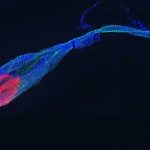Link to Pubmed [PMID] – 22645079
J Nat Med 2013 Apr;67(2):247-54
The Tn antigen (GalNAc-O-Ser/Thr) is one of the most specific human cancer-associated structures. In the present study we characterize the biochemical and functional properties of the Myrsine coriacea lectin (McL). We show that McL is an unusual high molecular weight highly glycosylated protein, which displays a strong Tn binding activity. The lectin exhibits in vitro inhibition of proliferation in the six cancer cell lines evaluated, in a dose-dependent manner (the strongest activity being against HT-29 and HeLa cells), whereas it does not exhibit toxicity against normal lymphocytes. McL could be exploited in the design of potential new tools for the diagnosis or treatment of cancer.

